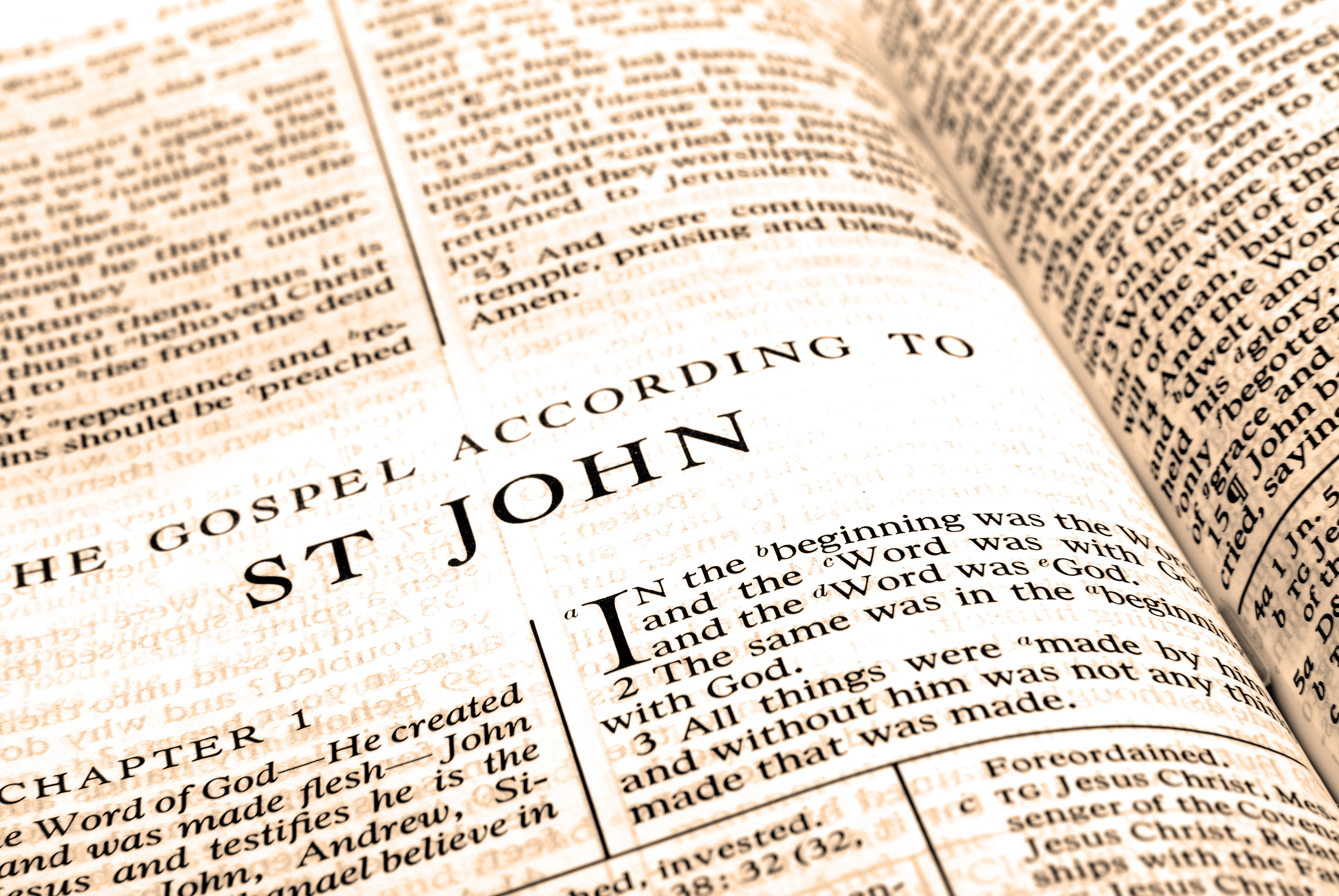The Golden Preface

"In the beginning was the Word, and the Word was with God, and the Word was God. The same was in the beginning with God. All things were made by him; and without him was not any thing made that was made. In him was life; and the life was the light of men. And the light shineth in darkness; and the darkness comprehended it not. There was a man sent from God, whose name was John. The same came for a witness, to bear witness of the Light, that all men through him might believe. He was not that Light, but was sent to bear witness of that Light. That was the true Light, which lighteth every man that cometh into the world. He was in the world, and the world was made by him, and the world knew him not. He came unto his own, and his own received him not. But as many as received him, to them gave he power to become the sons of God, even to them that believe on his name: which were born, not of blood, nor of the will of the flesh, nor of the will of man, but of God. And the Word was made flesh, and dwelt among us, (and we beheld his glory, the glory as of the only begotten of the Father,) full of grace and truth. John bare witness of him, and cried, saying, This was he of whom I spake, He that cometh after me is preferred before me: for he was before me. And of his fulness have all we received, and grace for grace. For the law was given by Moses, but grace and truth came by Jesus Christ. No man hath seen God at any time, the only begotten Son, which is in the bosom of the Father, he hath declared him>. " (John 1:1-18).
How exceedingly rich and blessed a privilege it is to us that our God should permit us to meditate upon Himself (Psalm 104:33-34). To have the Scriptures and with delight trace His purposes and counsels, His ways, faithfulness, loving-kindness, and mercy, is wonderful indeed, but beyond all this is the supreme favour that we should be engaged with, and delight in God Himself.
There are three well-known chapters in the New Testament where we get the glory or glories of our Lord set forth: John 1, Colossians 1, and Hebrews 1; each has its own peculiar character. Let us look a little at the first passage, which was called by the ancients "The Golden Preface."
At the outset let me say that, as being but finite creatures, we can neither grasp nor define eternity, neither can we fully know nor fathom divine Beings, the Triune God. Deity as such is beyond creature ken. All thought, all language is defective here: in the nature of things all must come short. Keeping this in view we see the importance of keeping close to the Holy Scriptures, where we have the only perfect and infallible standard of truth. Alone, absolutely alone, stands the written Word, contrasting with all else, and as far above man’s productions as the Creator is above the creature. What a mercy to have such a Book in a world like this!
And how important that we read it aright. There are two ways in which it may rightly engage our earnest attention: (1) careful reading and taking in divine facts, and (2) reading it in a devotional way. The importance of this distinction cannot, I think, be overestimated. The lack of the first is the cause of much ignorance, while lack of the other gives occasion for the well-known saying, "One may be as clear as a sunbeam and as cold as an iceberg."
In the other Gospels Christ is set before us as coming in relation to certain divine dealings which came out in the Old Testament, but in the Gospel of John He is presented as having come to make God known, and in connection with that which existed before the world was. He comes to reveal the Father.
"In the beginning was the Word," and if for a moment we read verse 14 along with this we see that "the Word became flesh" (JND). This is the incarnation. The One who is called God in verse 1 is said to have become flesh in verse 14. But note first of all the rich cluster of glories in these first verses. "In the beginning was the Word": eternity of being. And the Word was with God": personality. "And the Word was God": Deity. "The same was in the beginning with God:" co-equality. The One who is all this has been pleased to become flesh and dwell or tabernacle among us. This is the truth of the incarnation, stated here in words remarkable for their simplicity-stupendous in its greatness, incomprehensible in its nature, and marvellous beyond all telling in its results. Results wrought out in that body for God-Father, Son, and Holy Ghost; for man; for angels; for all creation; for time and for eternity. What a wonderful truth, then, is the incarnation. No marvel the Spirit says by the Apostle, "Great is the mystery of godliness, God was manifest in the flesh" (1 Timothy 3:16).
It is of all importance to have established in the soul first of all the truth of the Deity of the Word; and then we are enabled to see that He is also spoken of as Son. We do not need to leave the chapter before us for that. It is a solemn consideration that that which the mind of man views as contradictory is but bringing out the excellences of His person. One beautiful touch in this connection is given in Hebrews 1:8, where God the Father is presented as addressing God the Son in the words, "Thy throne, O God, is for ever and ever." But, some one asks, why insist on these things? Because they lie at the foundation of everything. All that concerns the glory of God and the blessing of man hangs upon who He is. The cross in its entire wonderful story has all its glory from the Person who hung there. "If the foundations be destroyed, what can the righteous do?" (Psalm 11:3).
But, says one, "It is beyond my depth." Perfectly right, so it is. It is a deep that knows no sounding. If I cannot understand it I can believe; and so can every Christian. Every Christian has faith (Ephesians 2:8), and therein lies the ability to lay hold on divine facts. If the truth is taken in, there is safety; the whole security for the Christian lies just there. To take in the truth is to have error exposed, and to take in the truth puts the soul in a position that the Spirit of God can unfold before its adoring gaze the depths of God. To meet error we do not have to explore the pit of evil: we need but to know the good.
Verse 3 is the work of His mighty power before incarnation. Creation is the product of almighty power, a power which calls into being things which previously had no existence, but in itself it comes in by the way, and is the platform for the display of what God is morally. This thought is introduced in verse 4: "In Him was life." Creation was by Him, life was in Him, and immediately we come to the moral sphere man is brought in "The life was the light of men." It is not said the light of angels, fallen or unfallen, because it was not distinctively for such. Fallen angels are never spoken of as recovered, and unfallen are kept in the order in which they were created, but for man God purposed to bring in eternal life, and this life is in His Son (1 Timothy 1; Titus 1:2; 1 John 5:10).
Next comes the sad tale of the light shining in darkness, but the darkness comprehended it not. What a picture of the incompetency of the creature to whom these counsels applied.
The intervening verses-6 to 13-have a character of their own, different from the five that go before and the five which follow after. His coming is viewed in relation to John’s witness to Him, to the people, and to those that received Him. They give in epitome His whole path here.
Verse 14, already mentioned, shows Him full of grace and truth. What a beautiful figure for our hearts to delight in, in the measure in which we have appreciation for what is morally excellent. Taken together with verse 17, it shows the perfect embodiment and expression of what God is in His nature as light and love, and it gives force to that word "of His fulness have all we received, and grace for grace," or "grace heaped upon grace" (compare Romans 5:17, "Abundance of grace").
But the parenthesis of verse 14 shows what He is with the Father, and goes deeper than display. John here brings the light of the Holy Spirit to bear back upon that wonderful path, and shows Him in His own unique distinction as an adequate object for the Father’s heart. The glory here is different from that in chapter 2. There it is dispensational and official, here it is personal and moral.
In verse 1 we have who He is, verse 14 what He became, but in verse 18 what He has done-revealed God; and this involves where He has gone-into death, for the culmination of all was in His death upon the cross. If in verse 3, then, is shown His mighty power as in Deity, this verse shows Him as Man in the condition to accomplish that which never could be done by creation. "Jesus, who was made a little lower than the angels, for the suffering of death" (Hebrews 2:9).
How wonderful that the God of glory should take this way of glorifying Himself!
My impression is that no stronger proof of His being God is to be found than this verse, for none less than God could reveal God. The words "in the bosom of the Father" are to be understood as His eternal place, a place He never left, and indicate that though He took the relative place by becoming Man, nevertheless He is absolutely God.
The meditation on these verses raises another question which is beautifully met by the Apostle in Colossians 1 with reference to this same subject. He is there leading on to the divine and eternal glories of the Lord, but in the preceding verses (Colossians 1:12-14) the question of our state is first settled, and this qualifies for the contemplation of these things. The soul at rest in His presence, every moral question settled, all gone in His death, we can meditate on Him.
What shall we say to these things, to the fact that the high and lofty One, the Omnipotent, the Eternal Son has become Man, "God manifested in flesh?" Truly it surpasses all thought, but where shall we find the cause? Blessed be His name, it is found in one word, love the love of God, and that love has found an outlet in this way, a way which never could have been conceived by the creature.
Matthew and Luke give the earthly and human side, but John gives the divine, and Paul, in Philippians 2 and Hebrews 10, goes back by the Spirit with John into the eternal regions, and shows us Who and where He was before being here in the likeness of man in the body prepared for Him.May the immensity of the favor rest upon our spirits, that such an occupation should be ours, that we should be permitted to behold our God (Isaiah 40:9) and to meditate upon Him (Psalm 104:33-34).
His works in creation, providence, and government may be explored, but it is through redemption He has made Himself known, and this hangs on the great truth of incarnation. Well might we say, "O the depth of the riches both of the wisdom and knowledge of God! how unsearchable are His judgments, and His ways past finding out…For of Him, and through Him, and to Him, are all things: to whom be glory for ever. Amen." (Romans 11:33, 36).





